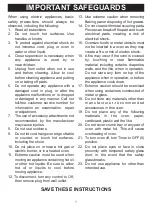
Caution:
Any cleaning agent
used incorrectly may damage
the appliance.
Always let the oven cool before
cleaning.
Some cooking operations generate a
considerable amount of grease. This,
combined with spillage, can become a
hazard if allowed to accumulate on
the appliance through lack of cleaning.
In extreme cases this may amount to
misuse of the appliance and could
invalidate your guarantee.
It is recommended that the appliance
is cleaned after open roasting.
Do not use caustic, corrosive or
abrasive cleaning products, products
containing bleach, coarse wire wool
or any hard implements, as they will
damage the surfaces.
All parts of the appliance can be
safely cleaned with a cloth wrung out
in hot soapy water.
Chrome plated parts
OVEN SHELVES
&
OVEN SHELF RUNNERS
,
GRILL PAN TRIVET
Do not use abrasives or polishes. Use a
moist soap pad. These items may also
be cleaned in a dishwasher.
Note:
Oven shelf runners can be
removed for cleaning. Grasp the
runners, and slide out of the hanging
holes as shown.
Painted, plastic & metal finish parts
DOOR HANDLE
,
CONTROL KNOBS
Only use a clean cloth wrung out in
hot soapy water.
Enamel surfaces
OVEN CAVITY
,
ROASTING TIN
&
GRILL PAN
We recommend that the appliance is
cleaned after open roasting, and also
after roasting at temperatures higher
than gas mark 5. Use of a trivet in a
roasting tin when roasting will help
reduce fat splashing.
Caution:
Most types of cleaning
agent will damage these surfaces.
Only use a few drops of washing up
liquid in hot water. Wipe the surfaces
with a clean cloth wrung out in hot soapy
water - if larger splashes of fat do not
readily disappear, scrub the area with
a nylon brush or nylon pan scourer
and hot soapy water. Rinse well and
heat the oven to dry the surfaces.
16
Pull out to clean
CLEANING
















































